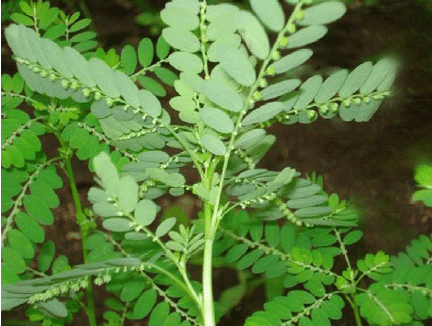
Small leaves, botanically known as Phyllanthus amarus Schum and Thonn. (Fam: Euphorbiaceae), is a small, erect, annual herb that grows up to 30-40cm in height. The plants of the genus Phyllanthus are widely distributed in most tropical and subtropical countries. The common names in English include “carry me seed”, “stonebreaker”, “gale of the wind”, “seed-under-leaf, and “egg woman”. Locally, it is called geeron-tsuntsaayee (bird’s millet) in Hausa; enyikwonwa or ngwu in Igbo and iyin olobe in Yoruba.
Constituents
The phytochemical analysis of the P. amarus extract confirmed the presence of tannins, saponins, flavonoids, steroids, terpenes, benzenoids, alkaloids and lipids, and also plant-based polyphenol, called phyllanthin.
Preparations
- amarus is available as capsules, powder and dried herbs. Its leaves, stems, and roots can be used to make teas, tinctures, and extracts. Poultices can be made with fresh shoots and leaves for topical application.
Pharmacological actions and medicinal uses
- amarus has antimicrobial, diuretic, antiviral, anti-diabetic, hypotensive, analgesic, anti-inflammatory and antipyretic properties. Thus its use in the treatment of infections of the bladder, urinary tract and skin, gonorrhoea, hepatitis B, jaundice, diarrhoea and dysentery. It is also effective in the management of wound, ulcers and urogenital diseases, including heavy menstrual bleeding.
- amarus is generally employed to treat chronic liver disease to reduce pain, expel intestinal gas, to stimulate and promote digestion, as anti-helminthic to expel intestinal worms and as a mild laxative.
The traditional uses of P. amarus for kidney stones and gall bladder stones have been validated by clinical research, where P. amarus extract was found to inhibit calcium oxalate crystal formation. Scientists have found that certain species of Phyllanthus may help prevent liver inflammation and damage.
Studies show that Phyllanthus amarus demonstrated in vitro and ex vivo HIV-1 inhibition of reverse transcriptase, receptors, and proteases, suggesting that Phyllanthus can eradicate the hepatitis B virus (HBV), thereby effecting cure for chronic infections.
Animal test-tube experiments by scientists have shown that an extract of Phyllanthus slowed tumour growth by inducing apoptosis in a wide range of cancer cells.
The nephroprotective properties of Phyllanthus against gentamicin and acetaminophen, which has been evaluated and demonstrated, is reported to be due to the inherent antioxidant and free radical scavenging constituent of the plant extract.
Adverse effects
Side effects tend to be mild and may include upset stomach and diarrhoea. It may further reduce uric acid levels and increase the risk of liver damage in people with Wilson’s disease.
Due to inadequate research, Phyllanthus should not be taken by children, pregnant women, and nursing mothers.
Use of Phyllanthus comes with the risk of drug interactions. Research has shown that concomitant use of Phyllanthus with blood thinners like aspirin can keep blood from clotting, leading to bleeding and easy bruising.
By potentiation, Phyllanthus can also potentially enhance the effects of antidiabetics and antihypertensives, causing a serious drop in blood sugar (hypoglycaemia) blood pressure (hypotension), respectively.
Economic uses and potentials
A pack of 500g dry powder costs about N17,500.00; a bottle of 30ml costs between N10,500 to N14,000. A pack of capsules costs about N12,500 to N25,000.
There are potentials for small leaves, Phyllanthus amarus, in research, pharmaceutical and cosmetics industries, and also in cultivation, processing, packaging, distribution and sales.
By Pharm. Ngozika Okoye
Pharm., MSc (Clinical Pharmacy), MPH, FPCPharm (Nigeria Natural Medicine Development Agency)










